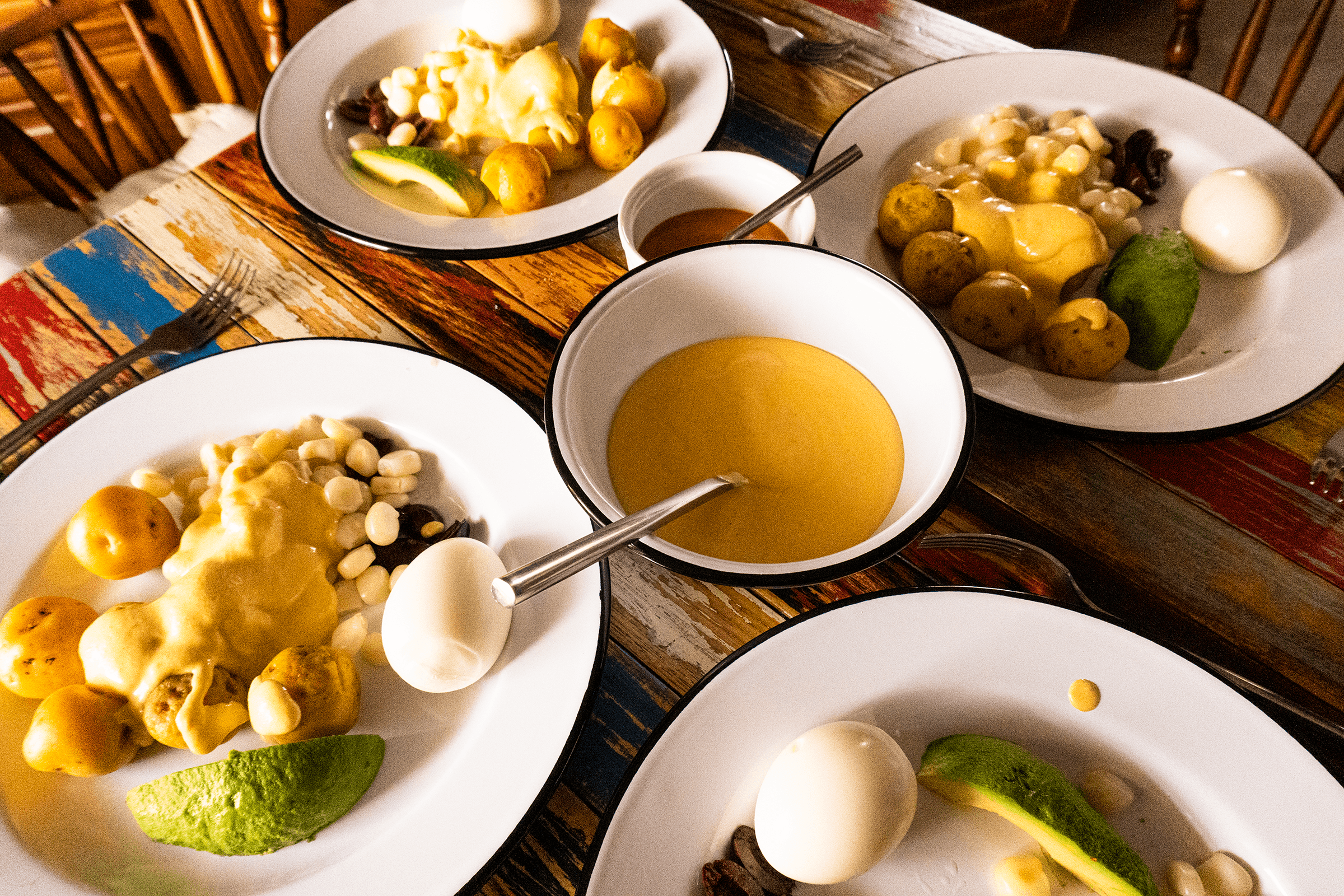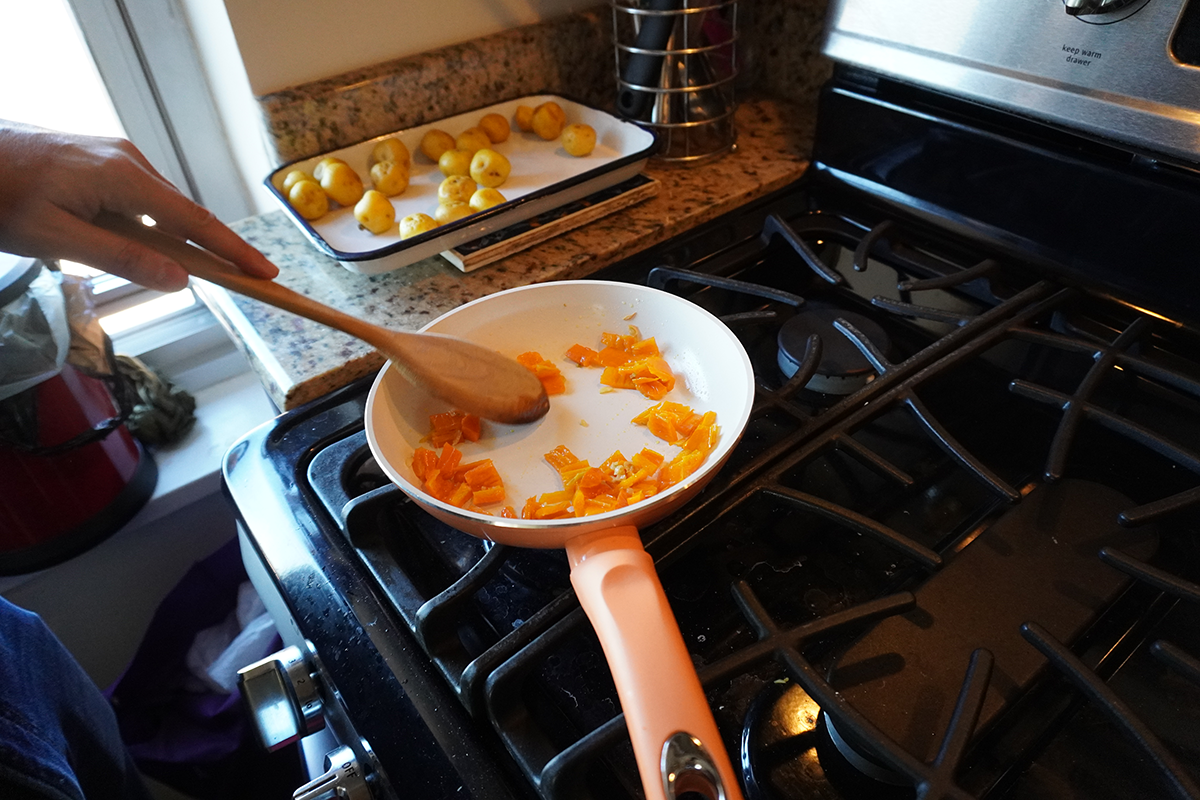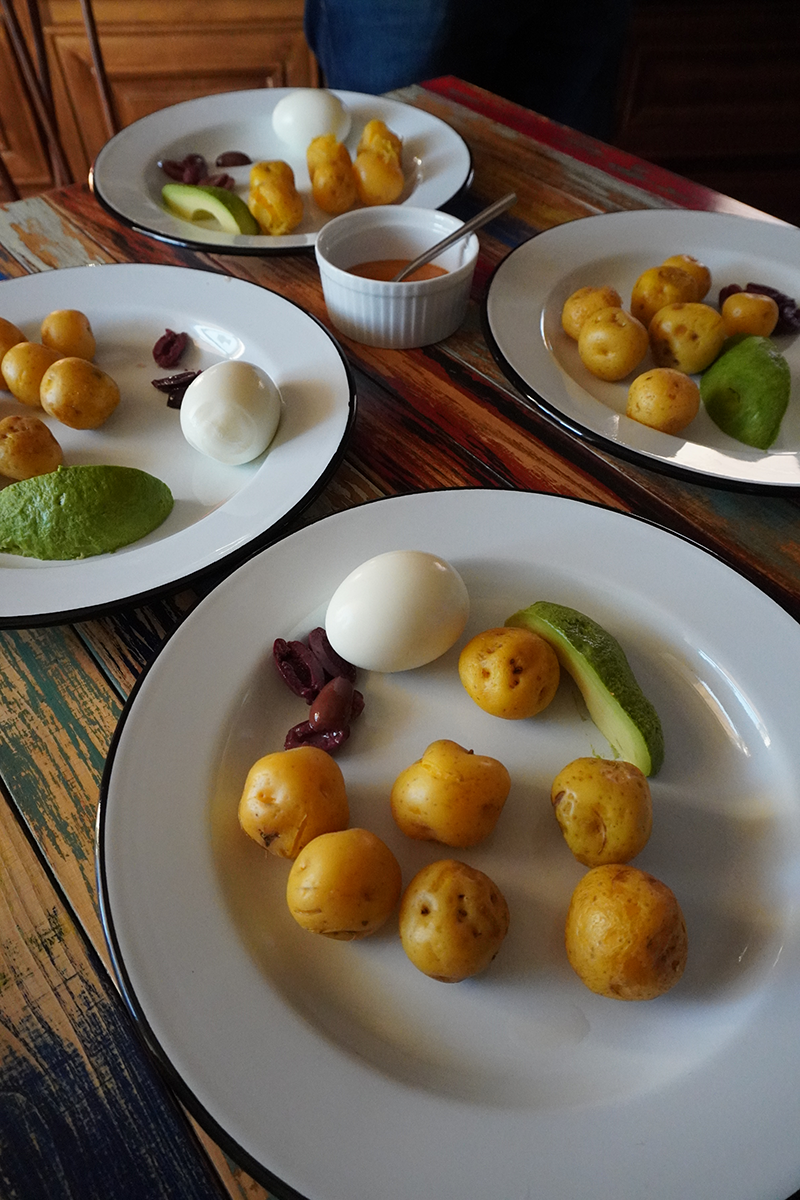
Papa a la huancaina neoyorquino
Esther & Benny
Esther Truzman is half Spanish and half American. She is a Spanish Language lecturer at New York University.
Benny Chueca was born in Peru. He has a Ph.D. in Hispanic Languages and Literature and teaches Spanish at colleges and universities in New York. As a writer, he has published in newspapers and magazines in Peru and literary magazines in NYC.
There’s a sense of bare intimacy in the act of both physically and metaphorically being invited into a space. The intimacy of a space can be momentous or continuous, but it’s always bred by the same things–intention and genuine interest.
Each time we open ourselves to enter a space it’s because we feel comfortable–because we feel important and valued–it’s a door that’s opened by someone that allows us to take a step back and marvel at the fact that “maybe our stories matter.” Much like discussions of representation in media, politics and social situations, “micro” moments of one-on-one exchange matter.
This was the case as we sat down to a uniquely neoyorquino Papas a la Huancaína in a 12th-story Lower East Side apartment that was meant to be a temporary home, as many of us believe New York City to be. The essentially Peruvian yellow pepper base is scavenged in Queens, melt-in-your-mouth potatoes have traveled many thousand miles from el Perú and the unbeatable texture of queso fresco has been lovingly replaced with Greek feta in the most “melting-pot” personification imaginable. And, at the confirmation of our hosts, the dish still tastes like home. Home for Benny is originally Perú, but the sense of the word, much like a teenager, has metamorphosed into a more complex meaning, encompassing his experiences in the San Felipe barrio of Lima, Greenwich Village, Brooklyn and the Lower East Side. For Esther, this dish personifies a new home in the Lower East Side with Benny.
The conversation takes us from kitchen preparations with fond descriptions of a mother’s recipes, to the dining table--where we trace back personal trajectories and reflect on reinvention (because what is reinvention if not a reflective state?)--to the living room, where the root of politics and economics come alive. We find that Esther’s reflection of teenage reinvention after moving from Spain to her mother’s native Brooklyn at twelve brings back memories of moving rather than immigrating. On the other hand, after a storied career in journalism, Benny found a new passion for literature in the cultural haven of New York and pursued professional reinvention with a master’s degree and, currently, a Ph.D.
The night wraps up as naturally as it started, with an empty bottle of wine to signal that our parting ways had begun. With our minds full of new perspectives and a rediscovered appreciation for a city that brings people together as often as it does new and unexpected ingredients, we head home to recommence the daily process of reinvention.
Text by Molly Rockhold














A Peek into Esther & Benny's Favorite American Food
Join us as Esther and Benny share their favorite American food and reflect on the cultural melting pot of New York City.

Papa a la huancaina
Ingredients:
24 oz. Potatoes (I use Dutch baby potatoes, these are creamy, or yellow Peruvian potatoes, these are floury)
8 oz. Feta Cheese (the saltier the feta, the better)
4 tsp Yellow Pepper Paste (Ají Amarillo)
1/2 cup Milk
1/3 cup Pecans or Walnuts
1 clove Garlic
2-3 Saltine crackers or 1 slice Sourdough bread
1-2 Kalamata olives per person
2 cups Peruvian corn in grain
1 Egg per person
Olive oil
Optional:
1 Avocado —half per plate
1 Lettuce leaf per plate
Instructions:
Boil the potatoes for 24 minutes or until you can pinch them easily with a fork without breaking apart. Peruvian potatoes must be closely monitored as they disintegrate if boiled for too long. Drain thoroughly. Boil the eggs for 12 minutes. Drain. Peel the eggs and cut them in halves. Boil the Peruvian corn in grain for 5 minutes. Drain thoroughly. Finely chop a clove of garlic and fry it in a pan with a drizzle of olive oil in low heat (almost minimum). When the garlic is slightly yellow, add the pepper paste. The reason for keeping it at minimum heat is that the paste contains water, and it will spatter if the oil is too hot. Combine the yellow pepper paste with the garlic and let it fry, occasionally stirring for about 10 minutes, until the water has reduced, and the color has changed to a darker orange. Break the cheese into pieces with your hands and put part of it in the blender. Add the fried yellow pepper paste. Add some black pepper and a drizzle of olive oil.
Start blending and slowly integrate the rest of the cheese, pecans or walnuts, and milk. The mixture must keep a creamy consistency. You can pour some more olive oil if necessary. If the mixture gets watery, you can add one or two salty crackers —previously breaking them with your hands. Blend until it has the consistency you like. Taste the salt. The feta cheese may be salty enough for the sauce. Serve the potatoes in dishes. Potatoes may be warm or cold. It depends on how you like it. My wife likes them warm. I like them cold as well. If you serve potatoes cold, accompany it with a lettuce leaf. If the potatoes are big, peel and slice them in 3/4” rounds. If they are small and look nice, just put them in the dishes without peeling. Pour the sauce generously over the potatoes. Accompany with a half cup of Peruvian corn, a boiled egg, and at least one olive per plate. I like to accompany the dish with half an avocado per plate as well.

